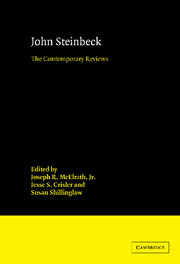Book contents
- Frontmatter
- Contents
- Series Editor's Preface
- Introduction
- 1 Cup of Gold (1929)
- 2 The Pastures of Heaven (1932)
- 3 To a God Unknown (1933)
- 4 Tortilla Flat (1935)
- 5 In Dubious Battle (1936)
- 6 Of Mice and Men (the novel, 1937)
- 7 The Red Pony (1937)
- 8 Of Mice and Men (the play, 1937)
- 9 The Long Valley (1938)
- 10 The Grapes of Wrath (1939)
- 11 The Forgotten Village (1941)
- 12 Sea of Cortez (1941)
- 13 The Moon Is Down (the novel, 1942)
- 14 The Moon Is Down (the play, 1942)
- 15 Bombs Away (1942)
- 16 Cannery Row (1945)
- 17 The Wayward Bus (1947)
- 18 The Pearl (1947)
- 19 A Russian Journal (1948)
- 20 Burning Bright (the novel, 1950)
- 21 Burning Bright (the play, 1950)
- 22 The Log from the Sea of Cortez (1951)
- 23 East of Eden (1952)
- 24 Sweet Thursday (1954)
- 25 The Short Reign of Pippin IV (1957)
- 26 Once There Was a War (1958)
- 27 The Winter of Our Discontent (1961)
- 28 Travels with Charley in Search of America (1962)
- 29 America and Americans (1966)
- 30 Journal of a Novel: The East of Eden Letters (1969)
- 31 The Acts of King Arthur and His Noble Knights (1976)
- 32 Working Days: The Journals of The Grapes of Wrath 1938–1941 (1989)
- Index
6 - Of Mice and Men (the novel, 1937)
Published online by Cambridge University Press: 03 May 2010
- Frontmatter
- Contents
- Series Editor's Preface
- Introduction
- 1 Cup of Gold (1929)
- 2 The Pastures of Heaven (1932)
- 3 To a God Unknown (1933)
- 4 Tortilla Flat (1935)
- 5 In Dubious Battle (1936)
- 6 Of Mice and Men (the novel, 1937)
- 7 The Red Pony (1937)
- 8 Of Mice and Men (the play, 1937)
- 9 The Long Valley (1938)
- 10 The Grapes of Wrath (1939)
- 11 The Forgotten Village (1941)
- 12 Sea of Cortez (1941)
- 13 The Moon Is Down (the novel, 1942)
- 14 The Moon Is Down (the play, 1942)
- 15 Bombs Away (1942)
- 16 Cannery Row (1945)
- 17 The Wayward Bus (1947)
- 18 The Pearl (1947)
- 19 A Russian Journal (1948)
- 20 Burning Bright (the novel, 1950)
- 21 Burning Bright (the play, 1950)
- 22 The Log from the Sea of Cortez (1951)
- 23 East of Eden (1952)
- 24 Sweet Thursday (1954)
- 25 The Short Reign of Pippin IV (1957)
- 26 Once There Was a War (1958)
- 27 The Winter of Our Discontent (1961)
- 28 Travels with Charley in Search of America (1962)
- 29 America and Americans (1966)
- 30 Journal of a Novel: The East of Eden Letters (1969)
- 31 The Acts of King Arthur and His Noble Knights (1976)
- 32 Working Days: The Journals of The Grapes of Wrath 1938–1941 (1989)
- Index
Summary
Charles A. Wagner.
“Books.”
New York Mirror, 24
February 1937, p. 25.
Of the two selections for March made by the Book-of-the-Month Club, and just published, we like best the young American Steinbeck's novel, though the veteran Britisher Wells, who shares the selection, has returned to the grand manner.
John Steinbeck's Of Mice and Men… is just about the closest thing to a little prose masterpiece in the social stir we have seen in years.
It is the story of two barley bucker pals who migrate from job to job along the grain belt. One is a towering giant with the strength of ten men but the brain of a child. The other hasn't the heart to get rid of him, for fear he will come to harm; to which, of course, he does.
But the cycle of friendship, even in tragedy, remains unbroken. And in the course of his swift-moving tale, Mr. Steinbeck gives us a holiday pageantry of portraits in toil, in men's passions and repressions, in workers’ dreams and devilments, told with a poet's eye to sounds and silences which makes his book a memorable thing indeed, and something at last to cheer about.
Lewis Gannett.
“Books and Things.”
New York Herald Tribune,
25 February 1937, p. 17.
“Guys like us, that work on ranches,” George told Lennie, “are the loneliest guys in the world. They got no family. They don't belong no place.
- Type
- Chapter
- Information
- John SteinbeckThe Contemporary Reviews, pp. 71 - 94Publisher: Cambridge University PressPrint publication year: 1996



